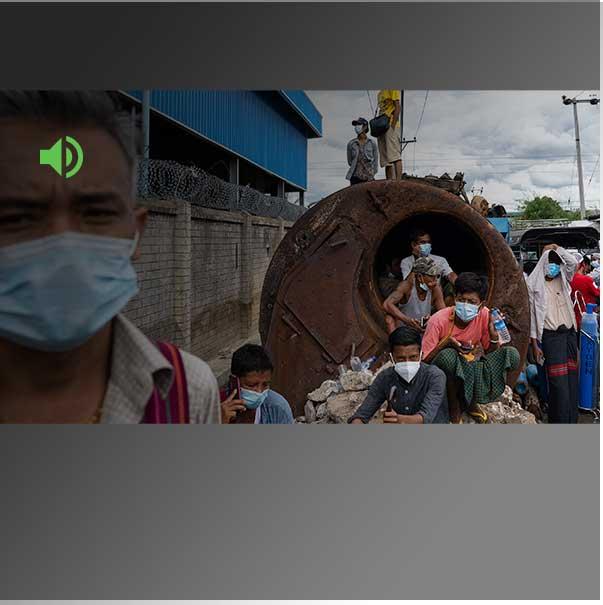What is Vladimir Putin's endgame in his escalation at the border of Ukraine -- what is his calculus as the situation unfolds? George Friedman, founder of Geopolitical Futures, joins the podcast to explain the situation and its geopolitical ramifications. How does Friedman assess the moves the White House has made so far -- and what should President Joe Biden do?
Below is a full transcript of the conversation, including time stamps. Full audio is posted above.
Mohamed Younis 00:00
Hello, ║┌┴¤═° Podcast listeners. Since our conversation with George was recorded, a more significant series of attacks on Ukraine by the Russian Federation have taken place. Keep that in mind as you listen into this fascinating breakdown of where things stand in this quickly developing conflict.
Mohamed Younis 00:23
For ║┌┴¤═°, I'm Mohamed Younis and this is The ║┌┴¤═° Podcast. In this week, we take a close look into the conflict in Ukraine, in what has become one of the most geopolitically critical moments in decades for Europe and the global order Dr. George Friedman is a ║┌┴¤═° senior adviser, geopolitical strategist and the founder of GPF. George, it's always awesome to have you on the show.
George Friedman 00:47
And I love it here too.
Mohamed Younis 00:48
Let's just start with a basic question: How critical is this moment for peace, for the balance of power in Europe? In other words, is my intro overstating what's going on?
George Friedman 00:59
Well, it's certainly one of the most dramatic moments in a long time. But like many dramatic moments, it's more drama than an event. What we have to understand is, first, that the Russians did this because they had to. They wanted to recover the borders they had going back to the 18th century, to protect themselves. This is not the beginning of this. The beginning of this was in Belarus, when they maneuvered the elections. It was followed by the affair in South Caucasus, where they manipulated the situation. And then there was also recently in Kazakhstan, where the Russians sent in peacekeeping forces. But the key for them is the hardest thing for them to get: Ukraine. Ukraine is what saved them from Napoleon; it saved them from Hitler. It is the deep entity they want.
George Friedman 01:52
So they set up tanks all around it, did nothing for a while, and then handed demands. One demand was that Ukraine not be admitted to NATO, which was easy because we were not going to admit them to NATO. The second was a deal killer: that no NATO forces be deployed in Eastern Europe or weapons given to them. And they knew that was a deal killer. So they wanted a crisis. They wanted these tanks there, and the United States, immediately after that, said, the Russians are attacking. Biden three times a day has announced, war is imminent.
George Friedman 02:31
So we know they're coming. That's the story there, but the United States made it more intense than it, than it was. And now we are in a situation where the Russians have invaded part of Ukraine. But It has to remember, this part of Ukraine revolted against Ukraine because it's primarily Russian, and they want to be part of Russia. And the Russians had troops in there for a long time -- special forces troops, little green men. So they invaded something they held. So at this point, when you look at the whole map of the thing, almost nothing has happened. But it's certainly a bit exciting to listen to.
Mohamed Younis 03:12
What's Putin's endgame in this kind of calculus, in the shorter term? Obviously you just perfectly laid out kind of the historic -- I hate to use this term -- the red line for Russia, geostrategically on the map and what this represents. But in these next few weeks or months, what's his own calculus? And right now, in his own mind, is he succeeding or is it not working out the way he hoped?
George Friedman 03:38
It's badly not working out the way out. He hoped that he could split NATO, and particularly Germany. And the Germans, interested in fuel from Russia and various business deals with Russia, they would break. And if they didn't get Ukraine back but they at least managed to split NATO, that was fine. Initially, Scholz, the new chancellor, seemed to go with that line: We're not going to give weapons to -- . And then there were several conversations, including a meeting with Biden, and he shifted his line directly back, so that, except for Hungary, every country has basically taken the same, same position.
George Friedman 04:24
And that means that he really can't do this unless he wages full-scale war, which he can't, and he really is now in a difficult position. I mean, he's invaded an area that wasn't necessary to invade. The Americans basically triggered some minor sanctions. And it's his move -- and that's a tough place to be in now.
Mohamed Younis 04:53
I want to, I'll get back to the strategy. But one tactic you alluded to here as I was watching this, George -- I actually was wondering what you thought of it -- was in the lead-up to kind of where we are now, where troops are going into a place Russia's already controlled; it's kind of a half invasion, it seemed like the White House was really active in sharing the play-by-play of what they were learning or what they thought Putin's next moves were. How much of -- it struck me, and I was wondering, you know, how wise is that? And I started thinking about how much of this really is an information war? You alluded to it a bit; react to that tactic for us at this moment. Do you feel like that was a better approach or, or not?
George Friedman 05:36
The United States did not want to threaten the Russians militarily, although there is a substantial amount we could do. By repeating over and over again that Russia is about to invade, when the Russians are saying, "No, we're not going to invade; don't, don't worry about it," and he's saying it, he raised in their minds a possible American military action -- by air, by missiles, and so on and so forth. And what I think Biden was trying to do is raise the stakes on the Russians: Let them know, without actually threatening them, that you don't know what we're going to do. So those tanks roll forward, you don't know if American missiles are going to come in there. And he wanted to create an uncertainty -- an uncertainty that would limit Russia's ability to move. And I think he did.
Mohamed Younis 06:26
OK, back to strategy. It's, it's hard to not ask the question, in the grander scheme, isn't the West really losing here? When we hear that Moscow has declared two regions in Ukraine as independent republics, the reaction was really -- obviously, it was very strict sanctions, but rhetorically it was just sort of, "That's preposterous. You know, you can't -- that's against international law; you can't do that." But weren't, you know, Putin's moves in Ossetia, Abkhazia and Georgia also written off as kind of tone-deaf and in violation of international law. Yet, here we are, in 2022, seeing a kind of a repeat in Eastern Ukraine? Is this slow, gradual, kind of inch-by-inch victory, if you will, really what Russia and other adversaries of the global order need?
George Friedman 07:17
Well, I think the Russians would answer, the people of this region want to be part of Russia. They do. They voted for that, and so on. We've been in that area; we're protecting it. The important thing to focus on is that, aside from the hysteria in the media, nothing has happened. The key thing to watch is the Russian tanks located in three regions, OK, have not moved. Russia has made no military move aside from this one -- international law is sufficiently ambiguous on everything, as to whether this isn't or not. Was this seizing an area or is this an area having seceded from Ukraine, wanting to join?
George Friedman 08:07
But what's been happening is the level of intensity -- we are nearly at war -- is not what Putin wanted. He wanted to create an atmosphere in which that was an option, but where there was going to be negotiation, particularly talking to the French, talking to the Germans, talking to everybody, so as to confuse the situation. So at this point, I mean, the idea that we are on the verge of war is altogether possible. But if I were Putin, I'd want the element of surprise, and the element of surprise was gone a month ago. We know where their tanks are; we know where their fuel dumps are. And that means that if he goes to war now, he's betting that the Americans won't do anything. Which may well be the case, but he's going to be making a big get -- big bet.
George Friedman 09:06
So when we look at the media and the way they've played this, they've played it like the Cuban Missile Crisis or Berlin Crisis or something like that. Well, in those cases, everybody was ready for a fight if they had to be. But as we look back at the Cuban Missile Crisis, now that the tapes for -- are released, Cuban Missile Crisis was not nearly as scary as it looked from inside. So, yeah, it looks like an international crisis. But really the interesting point is it's Russia's move. So far, for all its noise and everything, it's achieved nothing. It hasn't moved an inch; it's not gotten NATO to shift, nothing. Now we have at least one senior retired general calling for his resignation, which in Russia is not a normal event, and we have other people.
George Friedman 10:07
So there's a real question here is OK, he went to this; he thought he would get the Germans to cave. It meant that NATO would cave; that meant the United States would be alone and wouldn't go into it. None of these happened. So the question is now, what does Putin do? So far, he invaded the country and occupied it. That's about it. And he's got to do something.
Mohamed Younis 10:32
And it's, it's fascin -- I love how you just lay it out there. He's really, he's really kind of put his cards on the table, so to speak. And it's, everything's out in the open. What is -- and of course, not that everything is a huge conspiracy, but talk to us about kind of China's, not role, but angle in all this. You know, the conflict started the day after the Beijing Olympics. Obviously it's just symbolic; he didn't want to piss off Xi probably. But it's also no secret that the situation is being compared to Taiwan. In fact, Chinese officials recently made that comparison, to say this is nothing like what's happening in Taiwan. Why is this conflict relevant to China?
George Friedman 11:11
Well on the one side, it certainly looks good to have an ally. And China doesn't have any, many allies. Their only formal ally is Pakistan, which is not necessarily the heaviest weight you can throw. OK, so it gives both countries this illusion of strength. But the problem is, they can't help each other. From a military point of view, China is essentially a naval power protecting its east coast. It has an army, but it's primarily for defenses internally. The Russians have no navy. Well, that's not true. They have a navy, and it's not a bad one, but it's not going to be able to sail over into the Pacific, aid the Chinese. Where China might be able to help them is in case there is sanctions, maybe the Chinese can transfer money or something on that.
George Friedman 12:05
On the other hand, the Chinese have huge economic problems now. Their annual report came out the other day and said, our basic goal is to increase the wellbeing of the peasants. And that indicates they're off of the eastern cities, the tech companies and everything else. And they don't have that much cash after the collapse of the, of the real estate system. So it's a great symbol, and they really like doing it. But the American answer is interesting: They put two carrier battle groups right near the South China Sea. So what we signaled was we have enough force for both of you -- and we do. We are in that position.
Mohamed Younis 12:58
All right, for my last and final question -- last and final, of course -- and a question really very few people could answer, and probably would need to answer, George, but you could and probably have: In one sentence, if President Biden called you right now and said, "What do I do?" What's your advice in like two lines?
George Friedman 13:20
Do nothing. Force them to make the move. Just lean back, get your fighters, get your attack planes in position without announcing it to anybody, and call another meeting of NATO maybe. Just do nothing. The Russians have opened up this can of worms; they're gonna have to figure out how to get it back in the box. Don't help them.
Mohamed Younis 13:44
On that eloquent note, Dr. George Friedman, founder of GPF and ║┌┴¤═°'s senior adviser on geopolitics, George, thank you for checking in with us on this crazy week.
George Friedman 13:54
Thank you.
Mohamed Younis 14:01
That's our show. Thank you for tuning in. To subscribe and stay up to date with our latest conversations, just search for "The ║┌┴¤═° Podcast" wherever you podcast. And for more key findings from ║┌┴¤═° ║┌┴¤═°, go to news.gallup.com or follow us on Twitter @gallupnews. If you have suggestions for the show, email podcast@gallup.com. The ║┌┴¤═° Podcast is directed by Curtis Grubb and produced by Justin McCarthy. I'm Mohamed Younis and this is ║┌┴¤═°: reporting on the will of the people since the 1930s.



